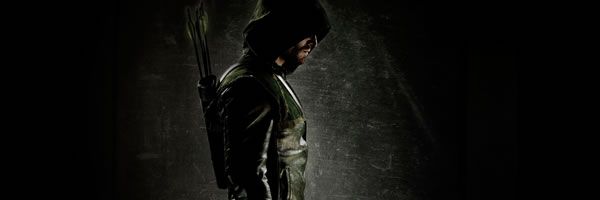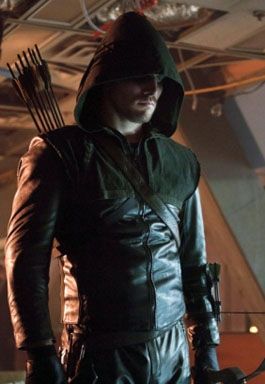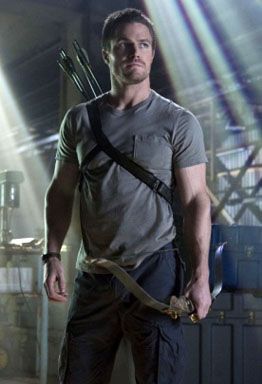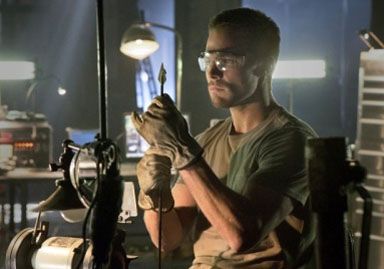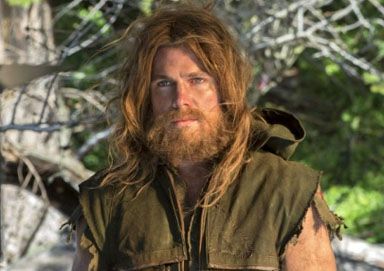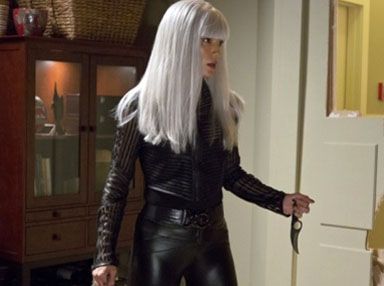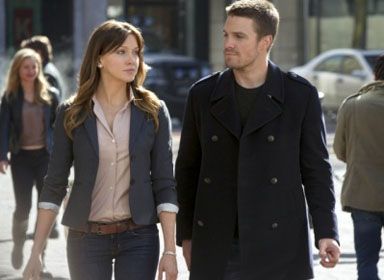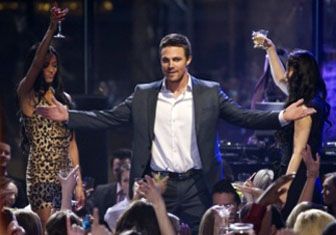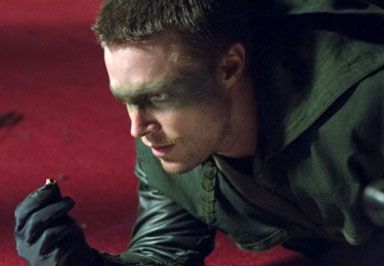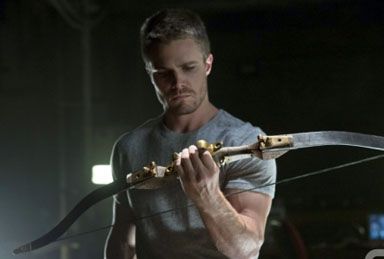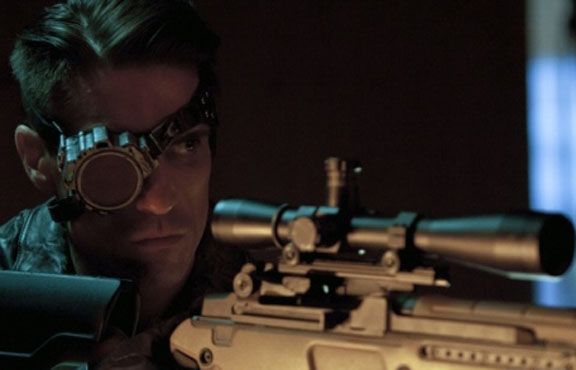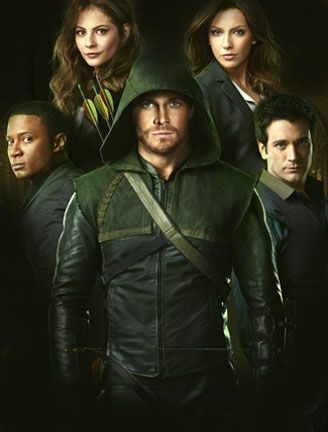The CW’s highly anticipated new drama series Arrow tells the story of billionaire playboy Oliver Queen (Stephen Amell), who has returned home to Starling City after being missing and presumed dead for five years, following a violent shipwreck. His devoted mother Moira (Susanna Thompson), much-beloved sister Thea (Willa Holland) and best friend Tommy Merlyn (Colin Donnell) welcome him home, while his former girlfriend, Laurel Lance (Katie Cassidy), is not so happy. Now, along with reconnecting to those closest to him, Oliver has secretly created the persona of the vigilante Arrow, to right wrongs and restore the city to its former glory.
During this recent interview held at the DC Comics office in Burbank, producers Andrew Kreisberg and Marc Guggenheim, along with DC’s Geoff Johns, talked about bringing Oliver Queen/Arrow to life in this format, adding characters from the DC universe throughout the season (including The Huntress, Deadshot and The Royal Flush Gang), how often viewers will get flashbacks to what occurred on the island, the darker elements of the series, how someone will discover Oliver Queen’s secret early on, the more long-term plan for the show, adding John Barrowman (Torchwood) to the cast, and big bad villains. Check out what they had to say after the jump.
Question: Were there a lot of internal discussions about whether Arrow should be a movie or a TV series, and how did you come to decide on this version of it?
MARC GUGGENHEIM: It actually started with Greg Berlanti. He had made this big deal with Warner Bros. Studios. Greg and I had done Green Lantern together, and he was thinking about which DC Comics characters would translate to television. He thought Green Arrow would be a really good one because the character is really grounded. If you look at the history of comic book characters on television, the series that have had the most success are the ones that hue a little bit closer to the street level superheroes than the more cosmic level superheroes. So, he approached me and asked if I would do it with him. We talked to the studio and to The CW, we brought Andrew [Kreisberg] in, and Geoff [Johns] has been involved, at every stage. It’s just been a hive mind at work. But, there was never really a discussion of, “Hey, we should do this as a movie.” It was always like, “Okay, what DC comic book characters do we want to do as a TV show.”
GEOFF JOHNS: Because Green Arrow had some awareness from Smallville, people know who he was, so it just made sense. Their take is certainly a TV take.
Other than Oliver Queen, can you talk about bringing some of the other iconic comic book characters to life, like The Huntress and Deadshot?
ANDREW KREISBERG: Huntress is played by Jessica De Gouw, who we think is going to be a huge break-out star. We’re really excited about her. A lot of the secondary characters came about when Geoff and I were sitting on set, freezing our butts off, in Vancouver, in the middle of the winter saying, “Wouldn’t it be cool, if we did this? Wouldn’t it be cool, if we did that?” Especially with Deadshot and The Huntress, they’re people who haven’t really been seen before. They’re very popular, iconic DC comics characters, who have never really been given their proper due, in mediums other than the comics. For us, as writers and creators and fans, what was most exciting for us was to take some of these lesser known characters and put the Arrow spin on them. For the most part, characters who are going to make the transition from the comic books to the show are the ones that have a very grounded reality. You won’t be seeing a lot of the characters who are aliens or who are people that have superpowers. For characters like Deadshot and The Huntress, they have very grounded and emotional backstories. At the heart of this show, it’s a drama. If you take away all the trappings of uniforms and arrows and super-villains, it’s really about people. For somebody like Deadshot, he’s just a very scary villain. That sort of malevolence is cool to see Oliver face. For The Huntress, they’ve got a very similar backstory. Both of their crusades were born out of pain and loss.
JOHNS: The Huntress was chosen because of the emotional resonance she has with Oliver Queen. That’s why I like all of the characters that are in the show. They all are connected to him, in some way.
Are you finding any inspiration in The New 52?
GUGGENHEIM: Oh, yeah! Actually, one of the things that we’ve really enjoyed, from The New 52, is the heavy Asian influence. Not to spoil anything, but you’ll start to see that seep into the show, in the latter part of the season. Starting in Episode 9, there’s a heavier Asian influence. One of the things from the comic that we’ve taken some inspiration from is that China has a long and storied history of archery. We’ll take our inspiration and our lead from wherever. We always try to tip our hat to the writers and artists who are influencing us.
For people not familiar with the comic, will you have a lot of flashbacks to the island, so that viewers learn about how Oliver Queen developed his skills?
KREISBERG: We’ll have flashbacks, in every episode. There’s really two series in one. There’s the flashback story, for which the end of the pilot shows Oliver reach the island. Episode 2 picks up with him setting foot on the island, for the first time. Ideally, however long the series runs, the last flashback in the last episode of the series will be Oliver seeing the boat that rescued him in the pilot. It will really be a loop.
JOHNS: It’s for graphic novel fans, as much as it is non-graphic novel fans. You’re learning a lot more about how he became the Oliver Queen he is now, on that island. Although, in comic books it’s delved into a few times, this is really going into it, in a whole new life. The whole DC universe is really brought into this island. One of my favorite aspects of this show is the contrast between Oliver’s Arrow and Oliver on the island ‘cause it’s not pretty. He gets his ass kicked, for sure.
GUGGENHEIM: One of the things we strive to do, and it’s hard so I’m not going to say we succeed with everybody episode, is to have the flashbacks not only tell this continuing story, but speak to the present-day story. So, the thing that Oliver is dealing with on the island has some either direct parallel or thematic parallel to what’s going on in the present-day story of the episode.
KREISBERG: If this material had been approached as a movie, the aspect of him on the island would have been dealt with and over with in about 15 minutes ‘cause you’d want to get to the main story. He’s one of the only superheroes who has a five-year origin story. Most of them have one traumatic event, but Oliver really had to live through this five years of hell and come out the other side. In the present-day story, for us to watch him become whole again, from this experience, and then, at the same time, see him deconstructed, we think it’s one of the most fascinating aspects of the show, and it’s something you haven’t really seen before. We want everybody to like this show. If you’ve never picked up a comic book, you have no idea who the Green Arrow is and you have no idea what DC Comics is, you can watch the show and really enjoy it. And yet, if you are a huge fan of the comics and Green Arrow, you will see enough of the DNA from the comic books, and enough of what makes the comic books special. Much to our delight and surprise, we feel like we’ve found this magical formula that lets new people come in, and yet also pays homage to the people who’ve been fans forever. Hopefully, we’ll be continuing that.
You have a superhero who is willing to kill people, so how do you find a way to have fans really love someone who will do darker things?
JOHNS: It’s all about his motivation and why he does the darker things. It’s pretty clear in the storyline, as it goes, why he crosses a line. Crossing a line isn’t something he does without being aware of it.
KREISBERG: It’s really something that affects him. With Oliver, he doesn’t set out to kill people, but if it has to happen, then it has to happen. But, he has his code. We’re not shying away from the affect his actions have on both him and on others. I would definitely say it’s not violence for violence’s sake. A lot of The Huntress story, you’ll see that she’s a darker version of Oliver and it puts his actions and his motivations into relief for him. As far as the other DC comics characters, or any character that we bring into the show, it’s always about, “How does this affect Oliver and why are we doing it this week?” The whole reason for bringing The Huntress on isn’t so we can just throw in a new DC comics character, even though she’s very cool. It’s really about having an emotional affect on Oliver. When we meet him in that storyline, he’s lonely and he’s feeling a little lost. And then, in comes this girl to his life, who’s the darker version of him, who he thinks he can save. It’s really Oliver’s story, more so than it is hers. That’s what makes it very cool.
JOHN: For those who don’t know who The Huntress is, her name is Helena Bertinelli and she is the daughter of a big crime boss. She decides to take it upon herself to take her family down, so she’s taking it down from the inside out.
KREISBERG: As much as we love bringing in the DC comics characters, it’s really important to us that this is really a show about Oliver Queen. When you get too close to the massively iconic characters, like Batman and Superman, you’re starting to suggest that there’s a bigger world outside of Starling City. For right now, we really want people to feel like Oliver Queen is the star of the show ‘cause he is.
Do you think you’ll ever bring those elements in?
JOHNS: Never say never!
Since Oliver’s secret won’t remain his secret for very long, what will that do to Oliver?
GUGGENHEIM: That’s where the story comes in. That’s where we get a lot of drama. Oliver is forced to start to see his own actions through other people’s eyes. Every story has to have an affect on Oliver. When we’re in the writers’ room and we’re thinking of a new episode, we start with, “Okay, what’s Oliver’s emotional journey for this episode? Where does he start, and where does he finish?” You’ll start to see, very early on, how that person who discovers his identity starts to affect a change on Oliver that has ripple effects throughout the series.
JOHNS: The person calls him out, which I like.
GUGGENHEIM: They call a spade a spade.
Will this show have an opening title sequence or will it just have a title card?
KREISBERG: We have a very, very cool title card.
GUGGENHEIM: We actually gave a lot of thought to, “Do you do a title sequence? Do you do a title card?” We tried a few title sequences. But, at the end of the day, from a production standpoint, we’re really trying to provide a cinematic viewing experience. We want it to look and feel like a movie. So, we found that a very cool title card made it feel more cinematic and just put you in this mind-set of, “I’m going to go along for this really cool ride that makes me feel like I’m watching a movie.” I couldn’t be more excited, actually. It’s a little bit of a fetish of mine. I got very micro-manage-y about it. I’m super excited about it.
How are you going to bring in The Royal Flush Gang, so that they fit in with the tone of the show?
KREISBERG: We don’t make any secret about the fact that we took a lot of inspiration from Chris Nolan and how he reconceptualized the world of Batman for The Dark Knight trilogy. He took somebody like Ra’s Al Ghul, who in the comic books is immortal and uses magic to sustain himself, and created a storyline and characters and slight-of-hand, so that you felt the DNA of that character in Liam Neeson portrayal without it actually being a direct copy. You’ll see with The Royal Flush Gang that the dynamic of the family and the iconography of the playing cards are going to be there without the supernatural bent. I think that we’ve come up with a really clever way to portray them, in a way that will make people who have been fans of The Scarecrow or Ra’s Al Ghul or Bane in the comic books, where they have bigger supernatural abilities, but then when you see Christopher Nolan’s adaptation, you go, “Oh, okay, I see how they reconceptualized that for a more grounded, realistic world.” The Royal Flush Gang are in Episode 6, and we’re really proud of that episode. We think it’s one of the most successful attempted alchemies that we’ve performed. The Huntress is pretty much straight out of the book because she’s such a grounded character. The Royal Flush Gang were probably the most outlandish villains from the comics, but they turned out to be our most grounded villains. The relationship that Oliver has with King, the leader of the gang, we’re really proud of. He’s played by Currie Graham, who’s a tremendously talented actor.
JOHNS: And Ace is much more interesting than an android.
What changes are you making to Speedy?
GUGGENHEIM: Well, first of all, obviously, the biggest change from the comic book is the fact that Oliver has a sister. While we’re talking about it, Oliver also has a mother who’s alive. Those were changes that really came about from the fact that it’s a television show, so you want to populate it with characters, but also you want to populate it with people who have a relationship to Oliver. We didn’t want to start the show, and he doesn’t have a family and he doesn’t have friends. We gave him Tommy Merlyn to have a best friend. It started with populating his word. As for the nickname Speedy, part of the fun for us is dropping Easter eggs, and teasing the fans and ourselves. And, as Geoff says, you never say never. There are a lot of seeds that were planted in the pilot that we have plans for, that won’t grow to fruition until year five, in some cases. But, there were a lot of decisions that we had to make, down to the various tattoos that are on Oliver’s body, that we needed to come up with answers to, and that you’re not going to see in Season 1. You may not even see it in Season 2. Some of them are very slow burn.
JOHNS: I would also say that just because her nickname’s Speedy, it doesn’t necessarily mean it’s going down a road you’d expect.
Do you have a five-year plan for this show?
GUGGENHEIM: There is definitely an element of counting our chickens before they’re hatched. It’s a weird thing that television requires, particularly with a show of this kind. You have to have a plan because there are just basic questions that you have to answer when you’re doing a pilot. Our philosophy is that I like to have an itinerary, but I also want to be open to things. We go, “You know what? It would be fun to do that a lot sooner than we planned. We really should take this moment that we were going to do in Episode 5 and push it to the end of the season.” So, you play around with your plan, but there is a plan, and the ultimate plan is to circle all the way back through the flashbacks. But, we also like to keep ourselves open to what we’re all discovering about the show. Once it gets on the air and we see what the audience is reacting to, we want to be able to respond to that. Greg, Andrew and I talk, all the time, about involving the audience in the process because that’s the other thing you can do on television that you can’t do in film. It becomes this dialogue.
KREISBERG: Especially now. It used to be that you’d write a letter campaign, but now, two seconds after it airs, you’ve got a Tweet saying, “You guys are great!,” or “You guys suck!” Hopefully, it’ll be more of the former and less of the latter. If you have a plan, you can always veer from it. I think the shows that we’ve been on, especially the genre shows like this, because we’re all fans of these kinds of shows, we know that the more secrets that we’ve dropped in the pilot, we will have ways to pay them off.
What was the ultimate decision to make it Starling City, instead of Star City?
GUGGENHEIM: I think it was the grounded thing. Star City sounds a little science fiction. It’s funny, it’s turned out to be one of the more controversial decisions that we’ve made.
JOHNS: We’re doing pretty good, if that’s one of the more controversial decisions.
KREISBERG: Star City is the nickname of the city, the same way that The Big Apple is the nickname for New York.
GUGGENHEIM: We want to always be respectful of the DNA, but put our own spin on things.
What has surprised you about bringing this particular Oliver Queen to life?
KREISBERG: When you’re working on a show, you find things as you go, even things that you didn’t quite realize, that the actors themselves bring to the role, and you see what relationships work well. We’re finding that Oliver’s relationship with his sister, Thea, who’s played by Willa Holland, is so special. The two of them have such a strong bond and, when you see them on screen together, there’s something really powerful there. It’s something that’s been developing for us, as writers, and we keep writing to that and bringing them together. In some ways, she’s what he’s fighting for because, despite her drug use and itinerant behavior, she is somewhat innocent.
JOHNS: On the island, Oliver Queen made a plan to become this tough human weapon. Then, he comes back and realizes it’s not that simple. There are people involved who need help, and his mission gets a little blurry.
What inspires Laurel to do what she does, in life?
KREISBERG: A lot of that is her father, and having lost Sarah, her sister. Laurel’s father is a good man and a good cop. He’s the one honest cop, in a rotten town. She’s always idolized him and, when she lost her sister, she threw herself into law school and became, in a lot of ways, exactly what Oliver became. She’s somebody who is going to stand up to the system to fight for what’s right, to make sense of a tragedy that happened to her and her family, and also to make her father proud and stay connected to him. He lost one daughter and cut a lot of emotional ties with Laurel because it was what his heart needed to do for him to go on. It’s interesting that a lot of the characters have all gone through the same thing. The boat crash that turned Oliver into a superhero had an effect on everyone, on the show. Some people went in the opposite direction and turned into less than savory people, and some people it turned into heroes, as well. Those ties between everybody are what makes up the series.
What can you say about John Barrowman’s character and how he fits into this world?
GUGGENHEIM: Whenever I see the dailies with him, the word that literally always comes to my mind is, “Magnetic.” He is incredibly magnetic, and incredibly charming. I’ll be honest, I haven’t seen Torchwood and, not having seen him in Torchwood, I’m like, “This guy’s unbelievable!” I come to his performance, on my own terms. He lights up the screen and he really energizes the actors that he has scenes with.
KREISBERG: I’m a lifelong Doctor Who fan. Like Peter Davison/Colin Baker, lifelong fan. So, when John Barrowman’s name came up for this part, they said, “Well, you should call him, Andrew,” which was amazing. I basically laid out the plan that we had for his character, and who he is and how he relates to everybody and what’s going on because we didn’t have a lot written, and I said, “So, I guess I’m asking you to take a leap of faith.” He said, “It’s funny, seven years ago, Russell T. Davies told me to take a leap of faith with him, and I hear your passion and creativity the way I heard his. So, let’s do it!” That was the best phone call I’ve ever gotten. What’s most exciting is that he’s not playing Jack. This is a completely different character. He’s just such a tremendously talented actor, and it’s one of the things we’re most proud of with the show. We just feel like, in addition to our newer actors, we have this incredible cast of actors who’ve done other things that we hope will make people realize that this isn’t just a standard superhero show. We’re really trying to do something special.
With such a big pilot episode, what will Episode 2 look like?
GUGGENHEIM: All of the lessons learned on the pilot have been applied to the series. There is an incredible amount of scope and production value with the show. We were very cognizant of how amazing the pilot looked, and we didn’t want the audience to feel like there was any bait and switch going on. That happens sometimes with pilots that have a lot of scope to them.
JOHNS: The island stuff in episode two is sick. It’s shocking!
Will the end of season one feel like a complete arc, or will it feel like it’s leading into Season 2?
GUGGENHEIM: I would say both.
KREISBERG: I’m a huge fan of Buffy, Angel and Doctor Who. People like Joss Whedon, Russell T. Davies and Steven Moffat are really amazing about making you feel like you had a complete meal, and yet leaving you hungry for more. Especially with shows like Buffy and Doctor Who, there’s a big bad and an overall story that feels like it comes to a completion, and we’ve definitely set that up. We have ways for that story to come to an end, and yet leave you feeling like there are a lot of unanswered questions, and that it’s going to take you into the next season. All of these kinds of genre shows, if they don’t feel like complete seasons, there’s something not quite right. You want to feel like you saw Chapter 1. We think of the first five episodes as one chapter, and episodes six to nine make you feel like that’s the second chapter. We’re actually writing episode 10 now, which feels like the first episode of a new chapter. So, if you think about it in terms of a book, there are chapters throughout the season, and then at the end of this season, that’s the end of Part 1, Volume 1.
GUGGENHEIM: While we’re sucking up to our various influences, one of our big influences was Ron Moore’s Battlestar Galactica, which I think did an amazing job of doing mid-season finales. We consider Episode 9 to be our mid-season finale, and we drew a lot of inspiration from how every season on Battlestar had that, but at the same time, you feel like there’s a completion to that chapter. The answer to that question is that it should always be both because that’s what makes for a satisfying viewing experience.
How different was gearing up Arrow, compared to what it was like with Smallville, over 10 years ago?
JOHNS: I was not around for that. I think I was just getting out of college and moving out here. I wrote a couple episodes for the last three seasons of Smallville, and that was a lot of fun. This is a very different show. It’s the next evolution of superhero shows. The take that Andrew and Marc have done, and the way Stephen plays Arrow and Oliver Queen, it’s like the next generation of that. It’s very, very different. It still honors the DNA of the comics like Smallville did, but it’s just a vastly different show. It’s a different take.
GUGGENHEIM: During the shooting of the pilot, David Nutter, who shot our pilot and the Smallville pilot, said, “I don’t think Smallville would work today because it’s a different world that we’re living in.” That was over 10 years ago. We’re living in a more cynical world. We’re living in a slightly darker world and a darker time. I think television does a very good job of reflecting what’s going on in society, and a character who is dealing with the haves versus the have nots, the pervasiveness of crime, the desire for hope, and all those things, reflects what’s going on. We write in reaction to what’s going on in the world.
KREISBERG: But, at the same time, we want to entertain people. Everything we’ve all said is true, but at the end of the day, we’re making what we hope is a really exciting, fun action-adventure show with a lot of emotion and what not.
Will you have a big bad villain this season?
KREISBERG: We have a big bad this season, and I think people are going to be both excited and surprised by their identity.
JOHNS: We’ve got a couple.
KREISBERG: Well, there are big bads, bigger bads, and a biggest bad.
GUGGENHEIM: There’s a glimpse of one of them in the pilot, actually.
Will they continue beyond one season?
KREISBERG: That depends on how good Oliver’s aim is.
Arrow airs on Wednesday nights on The CW.

